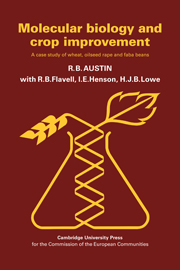3 - Molecular biology and plant breeding
Published online by Cambridge University Press: 04 August 2010
Summary
In the context of this report, molecular biology is the study of genes (DNA), their primary products (messenger RNAs) and their secondary products (proteins). Molecular biology thus complements ‘classical’ plant biochemistry, which deals with tertiary gene products, that is, molecules made or transformed by enzymes, including intermediary metabolites, secondary metabolites and those which have a structural and storage role.
The upsurge of research in molecular biology in recent years has been made possible by the improvement in biochemical techniques that were first developed many years ago, the discovery of restriction endonucleases and the capacity to manipulate genes following the discovery of methods for recombining DNA molecules and propagating them in E. coli. More recently, there have been considerable improvements in the methods for determining the base sequences of DNA and for synthesising oligonucleotides semi-automatically. Also, it is now possible to insert genes into some plants so that the effects of specific modifications of a plant genotype can be determined. Together, these techniques will enable new insights to be gained into many hitherto unresolved questions in plant biology. Foremost examples are the molecular basis of responses to environmental factors and the regulation of differentiation and development. As noted earlier, this knowledge of fundamental processes will enhance assessment of the scope for engineering particular changes in plant form and function and so enable attainable targets for genetic manipulation to be defined. The techniques themselves will provide breeders with the means for making directed changes in plant genotypes, so creating new opportunities for plant improvement programmes.
- Type
- Chapter
- Information
- Molecular Biology and Crop ImprovementA Case Study of Wheat, Oilseed Rape and Faba Beans, pp. 19 - 35Publisher: Cambridge University PressPrint publication year: 1986

